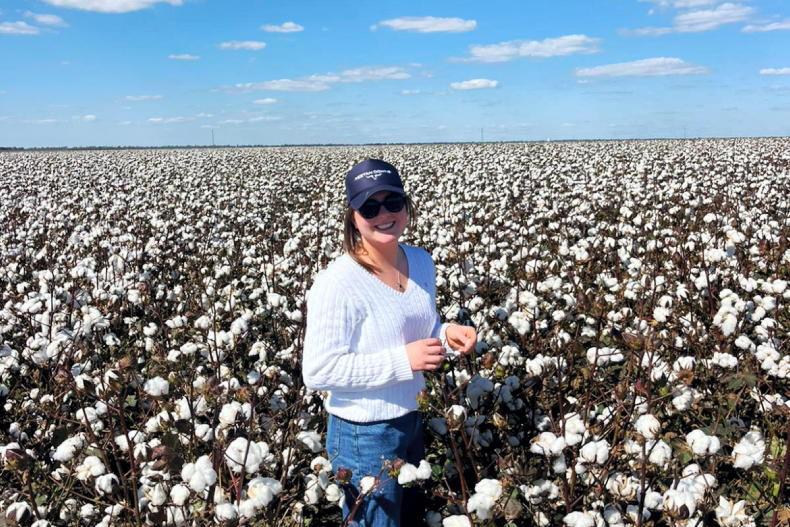"I am the eldest of five girls and grew up in Meath, where I quickly learned that being the oldest meant I was the guinea pig. Initially, I set off to conquer the world of engineering in Galway, but after a short-lived stint, I realised I was more interested in tractors than trigonometry.
“I reapplied to the CAO and chose Agricultural Science instead. My passion for agriculture stems from my family background; my grandfather, Stan Cosgrove, was an equine vet, and my father worked in the agri-business sector. As a keen horse rider, I have competed both nationally and internationally in eventing, further cementing my interest in agriculture. I have been fortunate to appreciate firsthand the importance of agriculture and its impact on business and society in Ireland, and I wanted to explore its influence abroad.
“University College Dublin’s Agricultural Science course appealed to me because it combines agricultural science with business and professional work experience.
Different scale
“During my PWE, I worked on a family-run farm in Morella, New South Wales, Australia. I was working with the Coulton family, who are regarded as pioneers of the cotton industry in southern Queensland and top cattle producers.
“Morella’s portfolio of property spans approximately 2,000,000 acres. They farm 8,000 hectares of irrigated cotton, 12,000 hectares of wheat, 12,000 hectares of barley, and 7,000 hectares of chickpeas. Not only do they farm crops they also are Angus Jap B3 breeders (5,000) and trade 14,000 cattle per year.
“One of the main differences between the farm in Australia and my home farm is the sheer scale. Before I arrived, a family friend, Sean Byrne, who put me in contact with the Coultons, kept emphasising the vastness of these farms.
One of the main differences between the farm in Australia and my home farm is the sheer scale
“He was right – during my first week, I was sent out with the diesel tank to the tractors and couldn’t find them in the field because it was so big. This exposure to large-scale farming has been incredibly eye-opening, from learning how they plan rotations each year to locating the tractors.
“The farm uses large-scale irrigation infrastructures, dams, and methods such as lateral (up to a kilometre long) and pivot irrigation to efficiently distribute water across huge areas. At home, we take water for granted, but in Australia, every drop is meticulously recorded. The water licensing rules and regulations were entirely new to me.
“Water licences are a structured approach to water management, ensuring equitable and sustainable water use, and balancing agricultural needs with ecological and other human needs. Supply and demand influence water prices, which can rise during scarcity, affecting farming costs and decisions.
“The interplay between climate conditions, water availability, and agricultural demand adds complexity to this dynamic. The Coultons budget their water supply each week. Ideally, you would have 10 megalitres/ ha. There are 60,000 megalitres of water stored in dams on farms and 30,000 in government dams upriver. You lose roughly 50% of water in the dams to evaporation and to try to counter they build the walls of the dam higher to reduce the surface area.
Changing environments
“Placement was challenging; I found it difficult to change farms roughly every four weeks. By the time I was getting the hang of one place, I had to move on to the next placement.
“However, I suppose it taught me to adapt to changing environments. I have enjoyed all my placements, some more than others, but each offered unique experiences. I started in January at Fenor Farms in Waterford, moved to Viastar Farm in Mullingar, then to Scotland for sheep farming, followed by a stint in Meath, and finally, Australia.
“I gained invaluable knowledge during my time in Australia, but the most significant lesson I learned is the importance of initiative. When you are abroad, you have to make things happen for yourself. If you don’t understand something, ask. If you want more work, ask.
“The Australian ‘work hard, play hard’ culture is similar to Ireland’s, but with more sunshine and more things that can kill you. My time in Australia was packed with hard work, learning, and many mishaps, but it was also full of unforgettable moments good and bad. Unfortunately, my time Down Under was cut short when I broke my pelvis in a riding accident and had to come home.
“I would strongly encourage anyone to pursue a degree in agriculture. As I mentioned previously, I switched from engineering to agriculture because it provided a broad foundation and the flexibility to focus on specific interests later. The agricultural industry offers numerous opportunities – we need farmers three times a day, and they will always be essential. Moreover, agriculture encompasses much more than just farming; it includes business, technology, and science.
“Perhaps I am naïve, but I don’t see any major challenges for young people in this sector. If you want something enough you will make it happen. There is support for young people in the industry – it’s just a matter of knowing where to look.”






 This is a subscriber-only article
This is a subscriber-only article










SHARING OPTIONS: